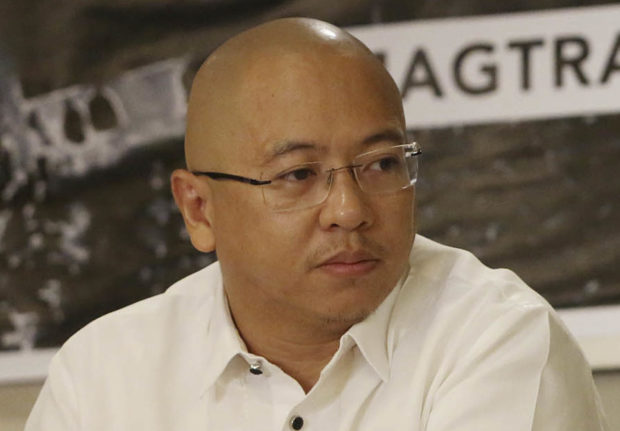The dismissal of the criminal case against high-profile drug kingpin Peter Lim and other alleged narcotics bosses has put the Department of Justice (DOJ) in a bind in a similar complaint involving detained Sen. Leila de Lima, former Solicitor General Florin Hilbay said on Tuesday.
Hilbay, one of the lawyers for De Lima, lamented how the DOJ treated the two complaints differently although they both involved alleged violations of Republic Act No. 9165, or the Comprehensive Dangerous Drugs Act of 2002.
In July 2016, President Duterte tagged Lim, who turned out to be his wedding compadre (cosponsor), as the biggest drug lord in the country.
“The DOJ applied the basic rules to confessed drug lords [but] created new rules and waived all legal doctrines with respect to someone who has been politically persecuted,” Hilbay told the Inquirer, referring to De Lima.
Rules changed
“This shows the political character of the war on drugs,” he said. “They bent the rules and drafted new rules just to justify De Lima’s detention. That is what’s fundamentally wrong in this war on drugs.”
The DOJ brought drug charges against De Lima after she, as chair of the Senate committee on justice and human rights, opened an inquiry into the thousands of alleged extrajudicial killings in President Duterte’s war on drugs.
Mr. Duterte’s allies in the Senate, however, stripped De Lima of the leadership of the committee and gave it to Sen. Richard Gordon, under whom the inquiry found no extrajudicial killings in the drug war.
De Lima incurred the ire of the President for investigating in 2009, as chair of the Commission on Human Rights, alleged killings by a death squad of suspected criminals in Davao when Mr. Duterte was mayor of the city.
‘Bogus’ drug war
Hilbay said the junking of the drug-trafficking case filed by the Philippine National Police Criminal Investigation and Detection Group (CIDG) last year also showed that Mr. Duterte’s crackdown on the narcotics trade, which had claimed the lives of thousands of mostly poor suspects, was “bogus.”
“It’s political in nature so it’s a fake war on drugs,” Hilbay said.
Besides Lim, also cleared by the DOJ panel of prosecutors were confessed drug kingpin Kerwin Espinosa, convicted drug lord Peter Co, Lovely Impal, Max Miro, Ruel Malindangan, Jun Pepito and several others known only by their aliases.
Espinosa and Co, who had been serving time at the state penitentiary in Muntinlupa City, both testified that De Lima collected protection money from the illegal drug trade while she was the justice secretary, an allegation the senator denies.
No corpus delicti
Hilbay pointed out that the DOJ prosecutors also faulted the CIDG for its failure to present the narcotics that the drug kingpins allegedly traded as the corpus delicti (evidence proving the crime) to be used against them.
Hilbay said the DOJ “conveniently” overlooked this basic legal principle in prosecuting drug cases in its recommendation to indict De Lima.
In fact, he said, the DOJ’s three separate resolutions against De Lima did not even mention the type of illegal drugs that the senator allegedly traded in conspiracy with convicted drug lords.
“In the case of the drug lords identified by the President himself, they decided to apply the basic rule requiring [the submission] of corpus delicti as evidence of the crime,” Hilbay said.
“In the case of De Lima, there’s no [confiscated illegal drugs presented as evidence]. But she has been in pretrial detention for over a year now,” he stressed.
The former solicitor general said the defense raised that legal issue in the motion for reconsideration it filed in the Supreme Court seeking a reversal of the tribunal’s decision that upheld the legality of De Lima’s detention.


